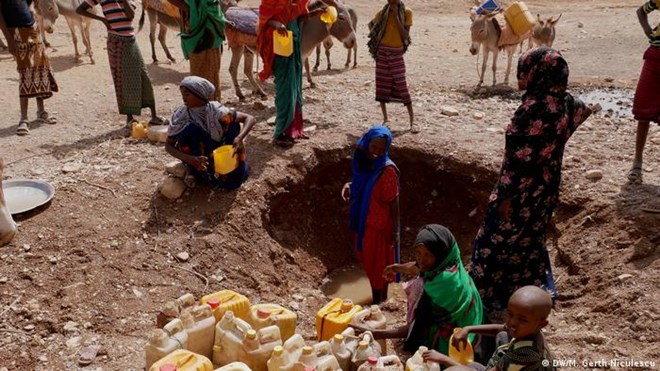The people on the Somali region of Ethiopia remain to be the worst region the country with large number of people having no access to potable water.
Only one person out of three had access to potable water last Ethiopian year 2020/21 ended July 7, 2021, according to the annual report of the National Bank of Ethiopia (NBE) released last month. Access to potable water in Somalia region in 2020/21 has increased to about 33.2 percent from around 28 percent the preceding year.
The statistics makes Somali region the top priority for both governmental and non-governmental agencies engaged in on potable water development in Ethiopia.
Meanwhile Somali region is among the top regions to improve access to potable water compared to all other regions of Ethiopia by registering annual growth of 5.2 percent compared to the preceding year 2019/20. The total number of people in urban areas in Somali region with access to potable water has increased by 16 percent reaching almost 51.8 percent in 2020/21.
Likewise the total number of people living in rural areas of Somalia region with access to potable water has also improved from 26.7 percent in 2019/20 to 29.9 percent showing an increase of 3.4 percent in 2020/21.
In 2020/21 the top region in Ethiopia in improving access to potable water in both rural and urban areas was Harari region registering 11.5 percent growth. The total number of people in Harari (rural and urban) with access to potable water has jumped to 76.5 percent in 2020/21 from 65 percent in 2019/20.
Next to Harari and Somali regions, Oromia has also registered 3.4 percent annual growth increasing the total number of the population in the region with access to potable water to about 60.4 percent in 2020/21.
Dire Dawa is the top region of Ethiopia providing access to potable water 84.9 percent of its inhabitants in 2020/21. Meanwhile compared to the previous year, the total number of people who had access to potable water in Dire Dawa has declined by 2.4 percent from 87.3 percent in 2019/20, according to the annual report of NBE.
Benishangul Gumz, and Southern region of Ethiopia have registered less than 1.8 percent annual growth in 2020/21 by increasing the total number of people with access to potable water to 64.3 percent and 48.2 percent, respectively.
Compared to 2019/20, Tigray, and Addis Ababa have also registered -1.1 percent annual growth providing potable water to 60.7 percent, and 62.6 percent of their total inhabitants respectively in 2020/21.
At national level in Ethiopia out of the over 110 million total population 58.5 percent of the people had access to potable water in 2020/21 showing only 2 percent growth from the previous year.





